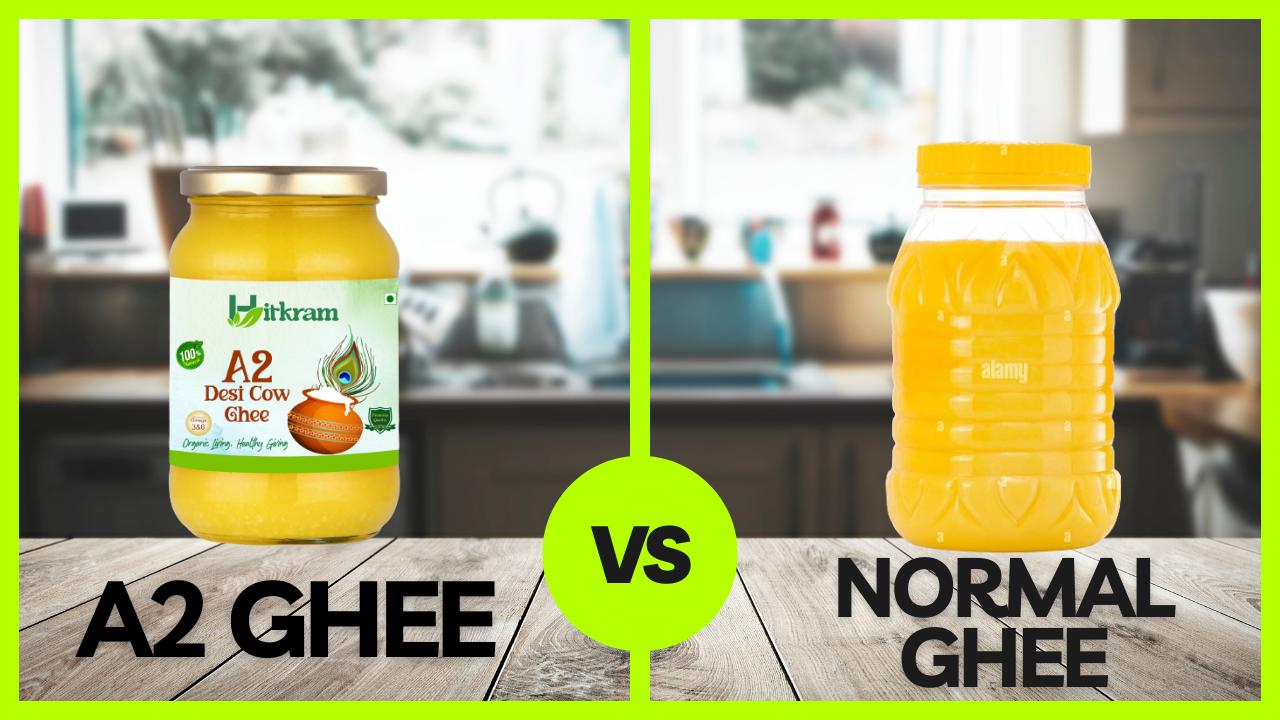A2 Cow Ghee vs. Normal Cow Ghee
Introduction:
In the world of dairy products, ghee has secured its place as a staple in many households. However, a growing debate revolves around the choice between A2 cow ghee and desi cow ghee. Both claim to offer unique benefits, leaving consumers wondering which one is truly superior. In this blog post, we'll delve into the characteristics, reasons, and considerations to help you make an informed decision.
Understanding A2 Cow Ghee
What is A2 Cow Ghee?
A2 cow ghee is derived from the milk of cows that produce A2 beta-casein protein. These cows, typically indigenous breeds like Gir, Sahiwal, or Red Sindhi, are believed to have a genetic makeup that yields milk with A2 beta-casein.
Health Benefits of A2 Cow Ghee:
Digestibility: A2 milk is considered easier to digest than A1 milk, making A2 cow ghee a suitable option for those with lactose intolerance or sensitive stomachs.
Nutrient Profile: A2 cow ghee is rich in essential nutrients such as vitamins, minerals, and healthy fats, contributing to overall well-being.
Potential for Anti-Inflammatory Properties: Some studies suggest that A2 milk may have anti-inflammatory properties, which could extend to A2 cow ghee.
Exploring Desi Cow Ghee
What is Desi Cow Ghee?
Desi cow ghee, on the other hand, is a broad term encompassing clarified butter derived from the milk of indigenous breeds such as Gir, Sahiwal, Red Sindhi, or even hybrid breeds.
Traditional and Cultural Significance
Ayurvedic Perspective: Desi cow ghee holds a significant place in Ayurveda, where it is considered a sattvic food known for promoting balance and health.
Cultural Practices: Many Indian households have been using desi cow ghee for generations, attributing various health benefits to its consumption.
Boosting Immunity: Traditional beliefs suggest that desi cow ghee may boost immunity and contribute to a healthier immune system.households have been using desi cow ghee for generations, attributing various health benefits to its consumption.
Health Benefits of Desi Cow Ghee:
Rich Nutrient Content: Desi cow ghee is believed to contain a diverse range of nutrients, including vitamins A, D, E, and K, along with essential fatty acids.
Reasons to Choose A2 Cow Ghee
Digestive Comfort: A2 cow ghee is often recommended for those who experience digestive issues with regular dairy products, as it is thought to be gentler on the stomach.
Potential for Lactose Intolerance: Individuals with lactose intolerance may find A2 cow ghee a suitable alternative, given its lower lactose content compared to A1 milk products.
Modern Research Support: Some recent studies support the idea that A2 milk may have benefits, lending credibility to the claims surrounding A2 cow ghee.
Considerations Before Choosing
Personal Health Needs: Consider your individual health requirements, including any existing conditions or sensitivities.
Cultural and Personal Beliefs: Take into account your cultural and personal beliefs, as these can play a significant role in the decision-making process.
Taste and Preference: The taste and texture of A2 cow ghee and desi cow ghee can vary, so personal preference may influence your choice.
Conclusion:
In the A2 cow ghee vs. desi cow ghee debate, there is no one-size-fits-all answer. The choice ultimately depends on individual preferences, health considerations, and cultural beliefs. It's essential to be informed about the characteristics and potential benefits of both varieties, allowing you to make a decision that aligns with your values and well-being. So, whether you opt for the gentle digestibility of A2 cow ghee or the cultural richness of desi cow ghee, both can be enjoyed as part of a balanced and healthy diet.



